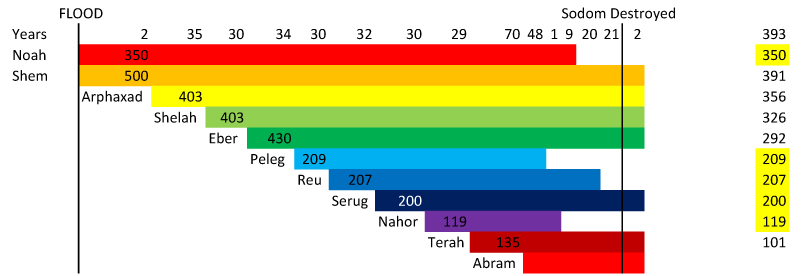Here are two different descriptions Paul wrote of himself, separated by an affliction.
|
Before the Affliction |
The Affliction |
After the Affliction |
| “All things are lawful for me” – but I will not be controlled by anything.
1 Corinthians 6:12b (NET) |
For we do not want you to be unaware, brothers and sisters, regarding the affliction that happened to us in the province of Asia, that we were burdened excessively, beyond our strength, so that we despaired even of living. Indeed we felt as if the sentence of death had been passed against us, so that we would not trust in ourselves but in God who raises the dead. He delivered us from so great a risk of death, and he will deliver us.
2 Corinthians 1:8-10a (NET) |
For we know that the law is spiritual – but I am unspiritual, sold into slavery to sin. For I don’t understand what I am doing. For I do not do what I want – instead, I do what I hate. But if I do what I don’t want, I agree that the law is good. But now it is no longer me doing it, but sin that lives in me. For I know that nothing good lives in me, that is, in my flesh. For I want to do the good, but I cannot do it. For I do not do the good I want, but I do the very evil I do not want! Now if I do what I do not want, it is no longer me doing it but sin that lives in me.
Romans 7:14-20 (NET) |
I’ve listed these passages as “Before…” and “After the Affliction” because Pride goes before destruction, and a haughty spirit before a fall.[1] I actually think that all of 1 Corinthians may have been written from somewhere deep within that affliction. Paul’s pride—I will not be controlled by anything—was relative—I am…sold into slavery to sin. I don’t believe it was pride in his own strength. The sense of invincibility that comes with the Holy Spirit’s ἐγκράτεια is all too familiar (and I don’t do miracles or see visions or write Scripture). The Greek word translated controlled is ἐξουσιασθήσομαι (a form of ἐξουσιάζω). When Jesus’ disciples debated which of them was to be regarded as the greatest[2] (μείζων, a form of μέγας), He said (Luke 22:25-27 NET):
The kings of the Gentiles lord it over (κυριεύουσιν, a form of κυριεύω) them, and those in authority over (ἐξουσιάζοντες, another form of ἐξουσιάζω) them are called ‘benefactors.’ Not so with you; instead the one who is greatest (μείζων, a form of μέγας) among you must become like the youngest, and the leader (ἡγούμενος, a form of ἡγέομαι) like the one who serves (διακονῶν, a form of διακονέω). For who is greater (μείζων, a form of μέγας), the one who is seated at the table, or the one who serves (διακονῶν, a form of διακονέω)? Is it not the one who is seated at the table? But I am among you as one who serves (διακονῶν, a form of διακονέω).
The other occurrences of forms of ἐξουσιάζω refer to control over a husband’s or wife’s body because of πορνείας (a form of πορνεία) in Corinth. It is not the wife who has the rights (ἐξουσιάζει, another form of ἐξουσιάζω) to her own body, but the husband. In the same way, it is not the husband who has the rights (ἐξουσιάζει, another form of ἐξουσιάζω) to his own body, but the wife.[3] The NKJV reads: The wife does not have authority over her own body, but the husband does. And likewise the husband does not have authority over his own body, but the wife does.[4] The negation οὐκ ἐξουσιάζει is absolute. I don’t believe such slavery is to be exercised apart from mutual consent on a moment by moment basis. To force my wife to have sex with me by the strength of my arm or a “law of Paul” is not love.
The Greek word translated sold into slavery is πεπραμένος (a form of πιπράσκω). Because he was not able to repay it, Jesus told a parable about the kingdom of heaven, the lord ordered him to be sold (πραθῆναι, another form of πιπράσκω), along with his wife, children, and whatever he possessed, and repayment to be made.[5] The slave (δοῦλος) asked his lord for mercy. The lord had compassion on that slave (δούλου, another form of δοῦλος) and released him, and forgave him the debt[6] until that slave would not forgive a fellow slave.
I’ve referred to Romans 7 often (in Romans, Part 28 most fully) as a description of a “house divided, one born of the flesh and of the Spirit”: 1) our old man (παλαιὸς ἡμῶν ἄνθρωπος; literally, “our old human”) was crucified with [Jesus] so that the body of sin would no longer dominate us, so that we would no longer be enslaved (δουλεύειν, a form of δουλεύω) to sin;[7] and 2) the new man (τὸν καινὸν ἄνθρωπον; literally, “the new human”) who has been created in God’s image – in righteousness and holiness that comes from truth.[8] The one thing I would correct here is: “I believe, however, that through faith I, the new man or woman, lay claim to more and more of my mind and my members.”
I want to correct what I was apparently thinking more than what I actually wrote. I assumed without grounds that the maturity of the new human through faith led to more independence. I’ve tripped over this assumption often without ever acknowledging it. The sentence of death has been passed against us who believe: Or do you not know that as many as were baptized into Christ Jesus were baptized into his death? Therefore we have been buried with him through baptism into death, in order that just as Christ was raised from the dead through the glory of the Father, so we too may live a new life.[9] Identifying with the new me cannot mean simply transferring allegiance from the old me to the new me who has been created in God’s image.
The new me is spirit, born of the Spirit; it is no longer I who live, but Christ lives in me. Maturity of the new human leads to more and more dependence upon his Holy Spirit. As 1 Corinthians 13 is a practical description of love, Romans 7:14-20 is a practical description of humbling oneself before God because it accurately describes the human condition vis-à-vis God the Father. We tear down arguments and every arrogant obstacle that is raised up against the knowledge of God, Paul wrote believers in Corinth, and we take every thought captive to make it obey (ὑπακοὴν, a form of ὑπακοή) Christ.[10]
The verb obey would have been a form of ὑπακούω, “to hear under (as a subordinate), that is, to listen attentively.” The clause καὶ αἰχμαλωτίζοντες πᾶν νόημα εἰς τὴν ὑπακοὴν τοῦ Χριστοῦ reads “and we lead away captive each thought into the attentive hearkening of Christ.” I’m not even depending on my attentive hearkening or obedience as a new human, but on Christ’s attentive hearkening or obedience through his Spirit, just as Christ was raised from the dead through the glory of the Father. With this in mind I’ll continue to look at “Paul’s Regime” and “Jesus’ Regime.”
|
Paul’s Regime |
Jesus’ Regime |
| I wrote you in my letter not to associate with sexually immoral people. In no way did I mean the immoral people of this world, or the greedy and swindlers and idolaters, since you would then have to go out of the world. But now I am writing to you not to associate with anyone who calls himself a Christian who is sexually immoral, or greedy, or an idolater, or verbally abusive, or a drunkard, or a swindler. Do not even eat with such a person. For what do I have to do with judging those outside? Are you not to judge those inside? But God will judge those outside. Remove the evil person from among you. | And to the one who conquers and who continues in my deeds until the end, I will give him authority over the nations – he will rule them with an iron rod and like clay jars he will break them to pieces, just as I have received the right to rule from my Father – and I will give him the morning star. The one who has an ear had better hear what the Spirit says to the churches.
Revelation 2:26-29 (NET)
|
Here Paul gave a fragment of the letter that preceded 1 Corinthians: [Do] not…associate with sexually immoral people (πόρνοις, a form of πόρνος). He didn’t mean the πόρνοις of this world, but didn’t make that clear apparently. In other words, what was written in the prior letter was the teaching (yeast, Matthew 16:5-12) of the Pharisees: Now when the Pharisee who had invited [Jesus] saw this, he said to himself, “If this man were a prophet, he would know who and what kind of woman this is who is touching him, that she is a sinner.”[11] Now all the tax collectors and sinners were coming to hear [Jesus]. But the Pharisees and the experts in the law were complaining, “This man welcomes sinners and eats with them.”[12]
The teaching of the Pharisees also helps explain why Paul used ζύμη in such a peculiar way, the yeast (ζύμῃ) of vice and evil. For Jesus, The kingdom of heaven is like yeast (ζύμῃ), and, the kingdom of God…is like yeast (ζύμῃ). He warned his disciples, Be on your guard against the [teaching] (ζύμης, another form of ζύμη) of the Pharisees, which is hypocrisy (ὑπόκρισις).[13]
Israel was instructed to eat the Passover dressed to travel, your sandals on your feet, and your staff in your hand. You are to eat it in haste.[14] The meaning of unleavened bread, bread without yeast, in the Passover meal was that the swiftness of Israel’s liberation from Egyptian captivity would not allow time for their bread to rise. It is stated clearly in Exodus 12:33, 34 (NET):
The Egyptians were urging the people on, in order to send them out of the land quickly, for they were saying, “We are all dead!” So the people took their dough before the yeast was added, with their kneading troughs bound up in their clothing on their shoulders.
While it is understandable that after centuries of eating unleavened bread at a holy festival, “In later times, ‘leaven’ and ‘corruption’ were regarded as synonymous terms,”[15] it is also fairly clearly the thought of religious minds. It was not ignorance: “During the festival of Maẓẓot [Passover] it was strictly forbidden to eat anything leavened…The reason for this prohibition is given in Ex. xii. 34-39…”[16] It was an active preference for the teaching of revered religious leaders or other human authorities, the teaching of the Pharisees and Sadducees and Herod.
To believers in Galatia Paul wrote about the teaching of the one who is confusing (ταράσσων, a form of ταράσσω) you,[17] that Gentile believers in Galatia should be circumcised, and called it ζύμη: A little yeast (ζύμη) makes the whole batch of dough rise![18] Though he was confident in the Lord the Galatians would reject that teaching in favor of his own, the former Pharisee did not yet call his ζύμη.
But now I am writing to you, Paul continued to believers in Corinth, not to associate with anyone who calls himself a Christian (ἀδελφὸς) who is sexually immoral (πόρνος), or greedy, or an idolater (εἰδωλολάτρης), or verbally abusive, or a drunkard, or a swindler. Do not even eat with such a person.[19] The Greek word translated to associate with is συναναμίγνυσθαι (a form of συναναμίγνυμι). The same word was translated do [not] associate closely in a letter to believers in Thessalonica: But if anyone does not obey our message through this letter, take note of him and do not associate closely (συναναμίγνυσθαι, a form of συναναμίγνυμι) with him, so that he may be ashamed. Yet do not regard him as an enemy, but admonish him as a brother (ἀδελφόν, another form of ἀδελφός).[20] Paul used μὴ the qualified negation in both instances.
The former sounds like excommunication while the latter sounds like some kind of in-house suspension. But I can’t blame the translators. To the Corinthians Paul wrote, Remove the evil person from among you.[21] To the Thessalonians he wrote, do not regard him as an enemy, but admonish him as a brother. To the Corinthians he wrote of πόρνος and εἰδωλολάτρης. Jesus had John write to the angel of the church in Thyatira about a woman who by her teaching deceives my servants (δούλους, another form of δοῦλος) to commit sexual immorality (πορνεῦσαι, a form of πορνεύω) and to eat food sacrificed to idols (εἰδωλόθυτα, a form of εἰδωλόθυτον).[22] I am throwing…those who commit adultery (μοιχεύοντας, a form of μοιχεύω) with her into terrible suffering, unless they repent of her deeds. Furthermore, I will strike her followers (τέκνα, a form of τέκνον; literally, children) with a deadly disease (θανάτῳ, a form of θάνατος; literally, death)…[23]
Jesus’ distinction between his deceived servants—terrible suffering (θλῖψιν μεγάλην)—and Jezebel’s followers—deadly disease (θανάτῳ, death)—was part of what caught my attention and encouraged me to compare and contrast Jesus’ and Paul’s regimes. Who but Jesus could make this judgment? Outwardly both groups were committing adultery with (μετ᾿, a form of μετά) her, possibly but not necessarily as her partner, inspired by her teaching, probably within a group she led. What I didn’t fully appreciate until doing this study was how fluid and continuous these groups were over time. Individuals in either group may have repented and Jesus’ deceived servants may have continued in Jezebel’s teaching and become her followers. Paul’s fear that false teaching might also function as yeast is not completely unfounded. The human preference for human teachers as opposed to being led (John 16:12-16) by the Holy Spirit is not something I can wish away.
I’ll pick this up in another essay.
[1] Proverbs 16:18 (NET) Table
[5] Matthew 18:25 (NET) Table
[10] 2 Corinthians 10:4b, 5 (NET) Both noun and verb are found in Romans 6:16 – ὑπακοήν and ὑπακοῆς (forms of ὑπακοή), ὑπακούετε (a form of ὑπακούω). Also Hebrews 5:8, 9 – ὑπακοήν (a form of ὑπακοή), ὑπακούουσιν (a form of ὑπακούω).
[13] Luke 12:1 (NET) The actual word order is: “the yeast which is hypocrisy of the Pharisees.” The argument could be made that yeast means hypocrisy in this case. I’m sticking with teaching on the assumption that Jesus would have said simply hypocrisy if that’s all He meant to say.
[15] http://www.jewishencyclopedia.com/articles/9694-leaven
[16] http://www.jewishencyclopedia.com/articles/9694-leaven
[19] 1 Corinthians 5:11 (NET) Table
[20] 2 Thessalonians 3:14, 15 (NET)
[21] 1 Corinthians 5:13b (NET) Table



